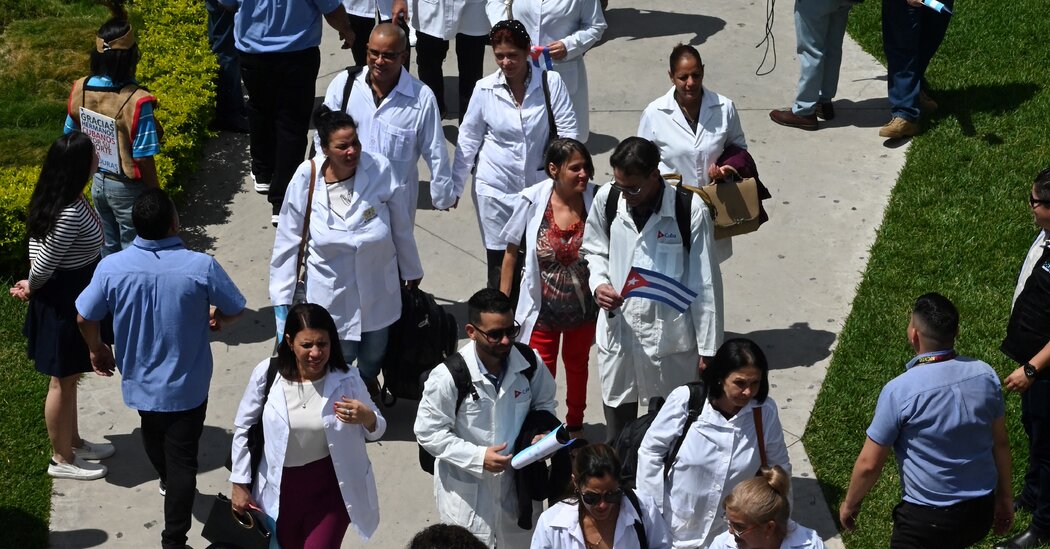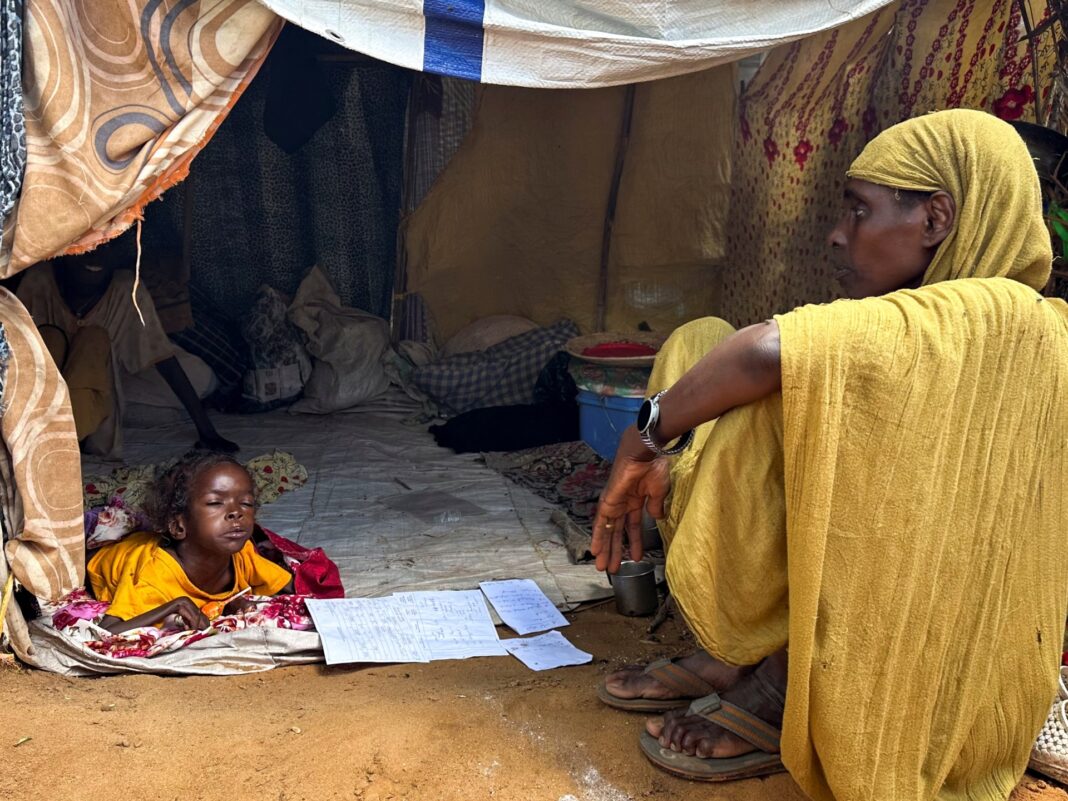As a newly minted U.S. citizen, Ramona Matos, once a doctor in Cuba, did not hesitate when deciding whom to vote for last year.
She chose Donald J. Trump, the candidate who promised to be tough on Cuba’s communist government.
She hoped he would help free the Cuban people and, in particular, put an end to a tool the government in Havana has used to soften its image around the world — one that Ms. Matos found particularly repugnant for personal reasons.
For decades, the Cuban government has sent thousands of health professionals to work in remote villages and cities in dozens of countries, where they get just a fraction of what the countries pay Cuba for their services.
“Those doctors are slaves to the Cuban dictatorship,” said Ms. Matos, 63, who, after posts at Cuban medical missions in Bolivia and Brazil, is a factory worker in South Florida.
Beginning on his first day in office, Mr. Trump has started tightening the screws on Cuba, including on its global medical program.
With a Cuban American secretary of state and an envoy to Latin America known as a longtime hawk on Cuba policy, the Trump administration quickly imposed tougher measures. It was the latest twist in the back-and-forth approach toward Cuba, which shifts from aggression to softening, depending on who occupies the White House.
The Trump administration reversed moves made by the Biden administration, returning Cuba to the list of state sponsors of terrorism, which limits its ability to do business around the world, and restoring the right of Americans to sue over property confiscated on the island decades ago.
Cuban officials have had their visas yanked and the administration has prohibited business transactions with companies controlled by Cuba’s military, intelligence and security services, which manage vital interests such as tourism and imports.
Republican administrations have tried to target Cuba’s medical missions before, but Mr. Trump is taking a harder line: In February, for the first time, the U.S. government said it would withdraw the travel visas of officials in countries that host the medical brigades.
The measure threatens one of Cuba’s main sources of currency, just as the nation grapples with a huge wave of migration, widespread power outages and food shortages.
It’s difficult to figure out exactly how much the medical program generates for Cuba — experts note that the government’s figures are often unclear, because it frequently changes the descriptions of the payments and lumps together different kinds of services.
Overall, Cuba earns more than $4 billion a year by exporting health care employees, construction workers, educators and other types of skilled workers, according to a study by Cuba Archive, a Miami-based human rights organization, which produced the findings for the State Department’s annual Trafficking in Persons report.
Four government officials, two from Venezuela and two from Cuba, have lost their travel visas to the United States over the new medical brigade policy, the U.S. State Department said.
“I don’t agree with everything Trump does, but on the subject of Cuba, I find it wonderful,” Ms. Matos said.
Cuba’s medical brigades work in dozens of countries from Africa to South America and the Caribbean.
Though they are often depicted as humanitarian missions for nations in need of health care, the countries pay Cuba for doctors, nurses, technicians and other service providers, helping the Cuban government fund its own health care system.
Cuban officials say the country currently has 24,000 people posted in 56 countries. The program peaked in 2014 but has declined over the past decade because of disputes with Brazil and cutbacks in Venezuela.
The health workers, who study medicine for free in Cuba, generally participate in the program willingly because they earn far more than they would at home.
But they only receive a portion — human rights activists say 2 to 15 percent — of what governments pay Cuba for their services. Half of the workers’ pay is held in a devalued local currency account in Cuba, from which they can withdraw only after returning home from their assignments.
Doctors who served overseas say their passports were taken from them, they were not allowed to socialize with locals and, in some communities, had to keep a 6 p.m. curfew. They also could not bring their families. Under the administration of President George W. Bush, doctors who fled the program were offered fast-track entry into the United States, and many deserted.
One doctor who fled in 2019 said the monthly salary she received in Venezuela’s local currency during a period of hyperinflation was enough to buy just a loaf of bread and a can of soda. She worked 48-hour shifts, often without electricity, and bunked with three other Cuban doctors.
“It’s a Cuban government business, literally,” said the doctor, who asked that she only be identified by her first name, Leydy, because the government sometimes harasses her family at home. “The truth is, it’s exploitation.”
Leydy is now studying to be a nurse practitioner in Florida. Because she never returned to Havana, the Cuban government kept the $10,000 she earned in Venezuela over 15 months, she said.
Maria Werlau, the executive director of Cuba Archive, the Miami-based human rights group, described the program as “a scheme for forced labor.”
The amount governments have paid Cuba per doctor varies, ranging from $900 in Guatemala to $5,000 in Kenya. In Equatorial Guinea, doctors received $1,000 of the $10,000 the government paid for them, Cuba Archive’s report said.
Ms. Werlau noted that U.S. federal law calls for sanctions against countries that participate in trafficking. While the State Department has accused Cuba of labor trafficking for years, Ms. Werlau believes the United States should also penalize governments that participate in the program.
The Cuban government insists that the medical program does not meet the international legal definition of labor trafficking because employees are not tricked and know where they are going.
The employees receive a salary, pension and a “decent” stipend in the destination country, where their lodging, transportation and often food expenses are covered, Cuba’s deputy foreign minister, Carlos F. de Cossío, said in an emailed response to questions.
“The Cuban professionals who participate do so voluntarily,” he said.
Mr. de Cossío said they have “complete freedom of movement,” an assertion human rights activists say hundreds of doctors who have left the program have disputed.
No countries have withdrawn from the program because of the new policy, Mr. de Cossío said.
Mr. Trump’s policy to cancel visas from officials of countries that participate in the program “is aimed at strangling the Cuban economy by means of threats and coercion on governments and entities of third countries, thus reinforcing the siege they have imposed for decades,” he said.
“Predictably,’’ Mr. de Cossío added, “it has affected our people’s standard of living, restricting income, damaging essential services such as electricity, water, transportation and health care.”
Leaders of several Caribbean countries have balked at the new visa rule and said they’d happily forfeit trips to the United States.
Jamaica has up to 400 Cubans, mostly nurses, who have filled important gaps in the nation’s medical care, said Christopher Tufton, Jamaica’s minister of health and wellness.
“We don’t have any evidence that there is trafficking taking place,” Mr. Tufton said in an interview.
In Trinidad and Tobago, where 87 nurses and nine doctors from Cuba work, the authorities have ensured that the program meets labor standards, Prime Minister Stuart Young said.
“We remain grateful to Cuban health care providers who provide service in key areas to people of Trinidad and Tobago in conditions that they and we can be proud of,” said Amery Brown, a medical doctor who serves as minister of foreign affairs. “The conditions are actually excellent.’’
But a Cuban doctor who had been posted in Port of Spain, the capital of Trinidad and Tobago, and who spoke on the condition her name not be published because she fears reprisals, said so much of her $3,500 monthly payment was kept in a Cuban account that it was difficult to survive.
Mauricio Claver Carone, Mr. Trump’s envoy for Latin America and a longtime advocate for tough sanctions on Cuba, said more countries needed to use a model like the one in Barbados, where the government hires doctors directly.
“We want to basically have a united voice against indentured servitude, against human trafficking,” he said.
In 2018, Ms. Matos sued the PanAmerican Health Organization, a U.N. agency that had a role in managing the program in Brazil. She considers it “modern slavery.”
“Isn’t that a slave, that you restrict a person from going wherever they want, talking to whoever they want?” she said. “Not to mention the salaries.”
Prior Beharry contributed reporting from Port of Spain, Trinidad and Tobago.


